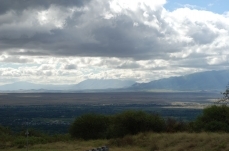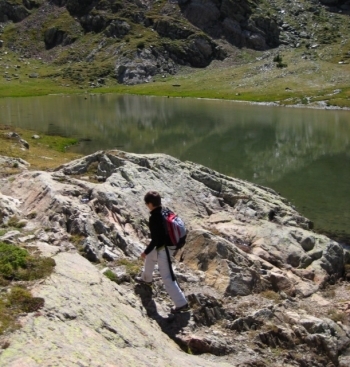Ecotourism (Environmental & Earth Science)
Ecotourism
The World Conservation Union (IUCN) defines ecotourism as: "Environmentally responsible travel to natural areas, in order to enjoy and appreciate nature (and accompanying cultural features, both past and present) that promote conservation, have a low visitor impact and provide for beneficially active socio-economic involvement of local peoples."
When executed correctly, ecotourism can generate multiple benefits such as securing funds for conservation, providing sustainable means for economic development of local communities, or fostering environmental awareness in travelers from their experiences.
Ecotourism strives to have minimal impact on the environment, cultivate an understanding and appreciation of local cultures and biodiversity, generate social, economic and environmental benefits, and include locals in decision-making processes. Yet, when tourism to natural areas does not comply with ecotourism criteria, the impacts can be far from beneficial. No limit on the number of tourists, no restrictions on activities or too much development can cause the demise of a once pristine natural environment and therefore its value as natural asset.
-
 Featured News Article
Featured News Article  Fall Colors 2011 (Ecotourism)USDA Forest Service launches expanded Fall Colors 2011 website Hotline provides information for peak viewing and trip planning Fall Colors 2011 is underway with the U.S.... More »
Fall Colors 2011 (Ecotourism)USDA Forest Service launches expanded Fall Colors 2011 website Hotline provides information for peak viewing and trip planning Fall Colors 2011 is underway with the U.S.... More »
-
 Featured Article
Featured Article  Big Bend National Park, United StatesBig Bend National Park is one of the two National Parks located in the state of Texas, in the USA. Big Bend National Park is located in the Big Bend region along the border of... More »
Big Bend National Park, United StatesBig Bend National Park is one of the two National Parks located in the state of Texas, in the USA. Big Bend National Park is located in the Big Bend region along the border of... More »
-
 Featured Article
Featured Article  Impacts of tourism and recreation in AfricaLand-based tourism is a major economic activity in Africa, drawing millions of visitors to different sites across the region every year and generating millions of dollars in... More »
Impacts of tourism and recreation in AfricaLand-based tourism is a major economic activity in Africa, drawing millions of visitors to different sites across the region every year and generating millions of dollars in... More »
 Big Bend National Park, United States Last Updated on 2014-10-19 16:55:59 Big Bend National Park is one of the two National Parks located in the state of Texas, in the USA. Big Bend National Park is located in the Big Bend region along the border of Texas and Mexico where the Rio Grande bends toward the Gulf of Mexico. Because the park contains a variety of habitat types including mountains, deserts, and riparian habitats, the park is home to a diverse flora and fauna. Visitors arrive at Big Bend National Park to hike, camp, watch wildlife, and experience the river by rafting or canoeing. Big Bend National Park is located in the big bend of the Rio Grande along more than 161 kilomters (100 miles) of the Texas-Chihuahua-Coahuila border southeast of El Paso, Texas in Brewster County, Texas. It includes a large portion of the Chihuahuan Desert as well as the Chisos Mountains on the Texas side of the Rio Grande’s expansive steep canyons. In 1933,... More »
Big Bend National Park, United States Last Updated on 2014-10-19 16:55:59 Big Bend National Park is one of the two National Parks located in the state of Texas, in the USA. Big Bend National Park is located in the Big Bend region along the border of Texas and Mexico where the Rio Grande bends toward the Gulf of Mexico. Because the park contains a variety of habitat types including mountains, deserts, and riparian habitats, the park is home to a diverse flora and fauna. Visitors arrive at Big Bend National Park to hike, camp, watch wildlife, and experience the river by rafting or canoeing. Big Bend National Park is located in the big bend of the Rio Grande along more than 161 kilomters (100 miles) of the Texas-Chihuahua-Coahuila border southeast of El Paso, Texas in Brewster County, Texas. It includes a large portion of the Chihuahuan Desert as well as the Chisos Mountains on the Texas side of the Rio Grande’s expansive steep canyons. In 1933,... More »  Sundarbans National Park, India Last Updated on 2014-09-09 11:56:45 Sundarbans National Park (21°31'-21°53'N, 88°37'-89°09'E) is a World Heritage Site that lies southeast of Calcutta in the 24-Paraganas District of West Bengal and forms part of the Gangetic Delta, which borders on the Bay of Bengal. Consists of Matla, Goashaba, Chhotahardi, Mayadwip, Chamta, Gona and Baghmara forest blocks, which are bounded by the Matla/Bidya and Haribhanga/Raimangal rivers to the east and west, respectively. The northern boundary is buffered by Netidhopani and Chandkhali forest blocks. Established as a national park on 4 May 1984 (Notification No. 2867-For). Previously created a wildlife sanctuary in 1977, having been designated as the core area of Sundarbans Tiger Reserve in December 1973. All forest in 24-Paraganas District was first notified as protected forest on 7 December 1878. Much of this was subsequently leased out by... More »
Sundarbans National Park, India Last Updated on 2014-09-09 11:56:45 Sundarbans National Park (21°31'-21°53'N, 88°37'-89°09'E) is a World Heritage Site that lies southeast of Calcutta in the 24-Paraganas District of West Bengal and forms part of the Gangetic Delta, which borders on the Bay of Bengal. Consists of Matla, Goashaba, Chhotahardi, Mayadwip, Chamta, Gona and Baghmara forest blocks, which are bounded by the Matla/Bidya and Haribhanga/Raimangal rivers to the east and west, respectively. The northern boundary is buffered by Netidhopani and Chandkhali forest blocks. Established as a national park on 4 May 1984 (Notification No. 2867-For). Previously created a wildlife sanctuary in 1977, having been designated as the core area of Sundarbans Tiger Reserve in December 1973. All forest in 24-Paraganas District was first notified as protected forest on 7 December 1878. Much of this was subsequently leased out by... More »  Sabah, Malaysia (Ecotourism) Last Updated on 2014-06-11 16:51:02 This article was researched and written by a student at Texas Tech University participating in the Encyclopedia of Earth's (EoE)Student Science Communication Project. The project encourages students in undergraduate and graduate programs to write about timely scientific issues under close faculty guidance. All articles have been reviewed by internal EoE editors, and by independent experts on each topic. Sabah is the easternmost state of Malaysia; located on the northeastern tip of the island of Borneo, it is one of two Malaysian states on the island. Sabah is the second largest state in Malaysia, next to neighboring Sarawak which eclipses Sabah in geographic size (to help keep this in perpspective, however, the entire nation of Malaysiaconsists of a land area slightly larger than the US state of New Mexico). A tropical state with a great... More »
Sabah, Malaysia (Ecotourism) Last Updated on 2014-06-11 16:51:02 This article was researched and written by a student at Texas Tech University participating in the Encyclopedia of Earth's (EoE)Student Science Communication Project. The project encourages students in undergraduate and graduate programs to write about timely scientific issues under close faculty guidance. All articles have been reviewed by internal EoE editors, and by independent experts on each topic. Sabah is the easternmost state of Malaysia; located on the northeastern tip of the island of Borneo, it is one of two Malaysian states on the island. Sabah is the second largest state in Malaysia, next to neighboring Sarawak which eclipses Sabah in geographic size (to help keep this in perpspective, however, the entire nation of Malaysiaconsists of a land area slightly larger than the US state of New Mexico). A tropical state with a great... More »  Fall Colors 2011 (Ecotourism) Last Updated on 2011-09-20 00:00:00 USDA Forest Service launches expanded Fall Colors 2011 website Hotline provides information for peak viewing and trip planning Fall Colors 2011 is underway with the U.S. Forest Service leading the charge to urge people to get outdoors, spend time in rural communities, and enjoy one of nature’s most spectacular seasons. “Fall is a special time when nature’s work transforms our landscapes into a natural patchwork of vibrant hues,” said Tom Tidwell, Chief of the U.S. Forest Service. “Because the Forest Service is the national source for tree expertise, we are ready to help Americans plan their trips and appreciate the incredible show.” For many rural communities, leaf peeping is a major source of revenue. Hotels, restaurants and local shops rely on the influx of dollars generated by the fall visitors. From coast to coast,... More »
Fall Colors 2011 (Ecotourism) Last Updated on 2011-09-20 00:00:00 USDA Forest Service launches expanded Fall Colors 2011 website Hotline provides information for peak viewing and trip planning Fall Colors 2011 is underway with the U.S. Forest Service leading the charge to urge people to get outdoors, spend time in rural communities, and enjoy one of nature’s most spectacular seasons. “Fall is a special time when nature’s work transforms our landscapes into a natural patchwork of vibrant hues,” said Tom Tidwell, Chief of the U.S. Forest Service. “Because the Forest Service is the national source for tree expertise, we are ready to help Americans plan their trips and appreciate the incredible show.” For many rural communities, leaf peeping is a major source of revenue. Hotels, restaurants and local shops rely on the influx of dollars generated by the fall visitors. From coast to coast,... More »  Ecotourism in Sabah, Malaysia Last Updated on 2010-05-25 00:00:00 This article was researched and written by a student at Texas Tech University participating in the Encyclopedia of Earth's (EoE) Student Science Communication Project. The project encourages students in undergraduate and graduate programs to write about timely scientific issues under close faculty guidance. All articles have been reviewed by internal EoE editors, and by independent experts on each topic. Sabah provides a wealth of opportunity for those seeking outdoor adventure or exploration; in the words of Dr. Ong Puay LIue of the University Kebangsaan, Malaysia: “Malaysia, and especially Sabah, have much to offer to people who appreciate nature, culture, adventure, history. Sabah is a microcosm of what there is on Earth – you want mountains, there are mountains. Valleys, islands, forest, wildlife, flora,... More »
Ecotourism in Sabah, Malaysia Last Updated on 2010-05-25 00:00:00 This article was researched and written by a student at Texas Tech University participating in the Encyclopedia of Earth's (EoE) Student Science Communication Project. The project encourages students in undergraduate and graduate programs to write about timely scientific issues under close faculty guidance. All articles have been reviewed by internal EoE editors, and by independent experts on each topic. Sabah provides a wealth of opportunity for those seeking outdoor adventure or exploration; in the words of Dr. Ong Puay LIue of the University Kebangsaan, Malaysia: “Malaysia, and especially Sabah, have much to offer to people who appreciate nature, culture, adventure, history. Sabah is a microcosm of what there is on Earth – you want mountains, there are mountains. Valleys, islands, forest, wildlife, flora,... More » 